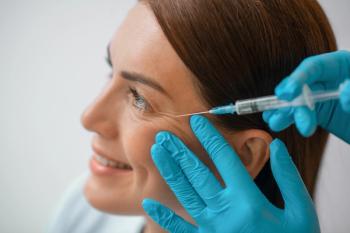
Tips for Difficult to Control Chronic Spontaneous Urticaria
Amanda L. Michaud, PA-C, shares insights on difficult to control chronic spontaneous urticaria at the ACAAI Annual Scientific Meeting.
At the American College of Allergy, Asthma and Immunology 2023 Annual Scientific Meeting, Amanda L. Michaud, PA-C, and colleagues shared solutions for challenging cases.
Here, Michaud, an allergy and immunology physician assistant in Jacksonville, Florida, shares insights and tips with Dermatology Times' readers in this exclusive interview.
"With difficult to treat chronic spontaneous urticaria, we typically think of the patients who remain uncontrolled despite high dose H1 antihistamines and, since we have a biologic available, those patients that typically remain not completely controlled despite being on biologic therapy as well. It is less common; it only affects about 1% to 3% of the population, and within that subgroup of patients, about 30% of patients will remain uncontrolled on omalizumab and high dose antihistamines. Or, they may be better, they may have had a clinical response, but not a complete response.
"Beyond omalizumab at the standard dosing, which is 300 milligrams every 4 weeks for chronic urticaria, we do have the option to updose these patients. Now this is technically considered off-label, but we have a lot of studies that have shown the efficacy with dosing ranges from 600 every 2 weeks to 600 every month or 450. It kind of varies based on the study. It has been shown to help a lot of patients that continue to have refractory hives.
"Beyond that, we have other immune modulating medications, and they all have varying degrees of efficacy. And they are used to help those patients that remain uncontrolled despite omalizumab. And we see a lot of success with these agents.
"I think out of everything I see in the allergy clinic, chronic hives is the most psychosocial debilitating disease. A lot of our patients have significant anxiety, significant stress related to their condition and the spontaneity of their skin symptoms and their episodes and reactions. A lot of these patients, about 40%, also have angioedema, so they can also have disfiguring symptoms on the face as well the soft tissues of the lips and the eyelids.
"The biggest concerns these patients have is the psychological side of it in addition to the severe itch. For a lot of these patients, if they have their itch controlled, they would be a lot happier.
"They are significantly concerned with there being something in their environment, something that they are eating or touching or surrounded by or that they use that is causing the trigger. But in the vast majority of patients, there is no trigger identified, it's idiopathic. And we know that, but it's hard to have that discussion with them and help them understand it's nothing that they're doing. It's important to provide that reassurance to them, which immediately that takes down that stress and anxiety level.
"The vast majority of patients with this condition, regardless of any treatment, their symptoms will resolve within 2 to 5 years. But about 30% to 50% will continue to have chronic hives beyond the 5-year period. So it's me making sure that we're maintaining their disease. I like to tell a lot of my patients, 'Don't suffer through it. If things flare up, if you're miserable, if you're itchy, if you're not controlled, please let us know. There's always more that we can do.'
"If you get their disease under control, the prognosis is quite good. Then we can try to taper off the medication. But, a lot of times when we taper off, patients will flare up again. So it's kind of this unpredictable course for a lot of patients, unfortunately.
"A lot of our patients will have come in after being referred from another specialty with a full battery of allergy tests, environmental testing, and food testing, when there is really no clinical indication to ever order a full food panel. We see that a lot. And the challenge is that we see a lot of false positives, and that adds to the confusion. You already have a very anxious patient with a very disabling condition. And you just ordered a full food panel on them and now they think they have a bunch of food allergies. It's really difficult to come back from that. We spend a lot of time un-diagnosing perceived food allergies with these patients."
Transcript has been edited for style and length.
Do you have tips for challenging cases in dermatology? Share your insights with us for a chance to be published. Email us at DTEditor@mmhgroup.com.
Newsletter
Like what you’re reading? Subscribe to Dermatology Times for weekly updates on therapies, innovations, and real-world practice tips.











